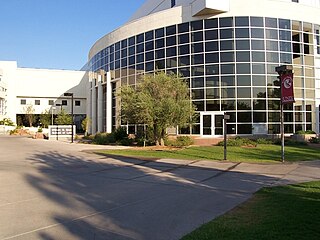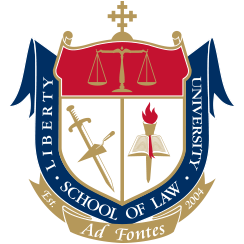
Loyola Law School is the law school of Loyola Marymount University, a private Catholic university in Los Angeles, California. Loyola was established in 1920.

Quinnipiac University School of Law is the law school of Quinnipiac University located in North Haven, Connecticut. Quinnipiac Law is the newest law school in Connecticut, having received full accreditation from the American Bar Association (ABA) in 1992. It is a member of the Association of American Law Schools, and is currently ranked tied at 143rd by U.S. News & World Report.

Southwestern Law School is a private law school in the Mid-Wilshire neighborhood of Los Angeles, California. It is accredited by the American Bar Association and enrolls nearly 1,000 students. Its campus includes the Bullocks Wilshire building, an art deco National Register of Historic Places landmark built in 1929. Southwestern is an independent law school with affiliation to the undergraduate program at California State University, Northridge.

The University of Maine School of Law is a public law school in Portland, Maine. It is accredited by the American Bar Association and is Maine's only law school. It is also part of the University of Maine System. The school's current dean is Leigh Saufley, who assumed the post in 2020. Until 1972 the School of Law was located at 68 High Street, Portland. In 1972, the School of Law moved to the University of Maine School of Law Building, which is adjacent to the University of Southern Maine's Portland campus. In 2023, the Law School moved to 300 Fore Street, on the waterfront of downtown Portland.

The William S. Boyd School of Law is the law school of the University of Nevada, Las Vegas (UNLV) and the only law school in Nevada. It is named after William S. Boyd, a Nevada attorney and co-founder of Boyd Gaming Corporation who provided the initial funding for the school. The school opened in 1998 and graduated its first class in 2001.
Western State College of Law at Westcliff University is a private, for-profit law school in Irvine, California. It offers full and part-time programs and is approved by the American Bar Association. Western State pays a fee to receive services from the Association of American Law Schools (AALS).
Chapman University's Dale E. Fowler School of Law, commonly referred to as Chapman University School of Law or Fowler School of Law, is a private, non-profit law school located in Orange, California. The school offers the Juris Doctor degree (JD) and combined degree programs including a JD/MBA, and a JD/MFA in Film & Television Producing. The school also offers emphasis options in Business Law, Criminal Law, Entertainment Law, Environmental Law, Entrepreneurial Law, International Law, Trial Advocacy, and Taxation. Currently, the school has 38 full-time and 70 part-time faculty and a law library with holdings in excess of 290,000 volumes and volume equivalents.

The Texas Tech University School of Law is an ABA-accredited law school located on the campus of Texas Tech University in Lubbock, Texas. The school offers three academic centers, ten dual-degree programs, a nationally recognized legal writing program, and a competitive advocacy program that has earned 45 national and international championships. Additionally, third-year law students may participate in one of the school's eight clinical programs, which allow students to gain real-world experience while providing free legal representation to low-income individuals. The school focuses on forming practical lawyers who are ready to practice law upon graduation. The student population is approximately 60.4% male and 39.6% female.
The Thurgood Marshall School of Law (TMSL) is an ABA-accredited law school at Texas Southern University in Houston, Texas. It awards Juris Doctor and Master of Law degrees. Thurgood Marshall School of Law is a member-school of the Thurgood Marshall College Fund and Association of American Law Schools.

St. Mary's University School of Law is the law school of St. Mary's University, a private Catholic university located in San Antonio, Texas.

Southern University Law Center is a public law school in Baton Rouge, Louisiana. It is part of the historically black Southern University System and was opened for instruction in September 1947. It was authorized by the Louisiana State Board of Education as a Law School for blacks to be located at Southern University, a historically black college, and to open for the 1947-1948 academic session.

The Norman Adrian Wiggins School of Law is a private law school in Raleigh, North Carolina, United States. Founded in 1976, the law school is one of six graduate programs offered by Campbell University. The school is named after its founder, Norman Adrian Wiggins, former President and Chancellor of Campbell University, and creator of the institution's law division. Originally housed on the main campus of Campbell University in Buies Creek, the school moved to a newly constructed facility in downtown Raleigh in September, 2009.
Widener University Delaware Law School is a private law school in Wilmington, Delaware. It is one of two separate ABA-accredited law schools of Widener University. Widener University Law School was founded in 1971 as the Delaware Law School and became affiliated with Widener in 1975. In 1989, it was known as Widener University School of Law when it was combined with the campus in Harrisburg, Pennsylvania. In 2015, the two campuses separated, with the Harrisburg one renamed to Widener University Commonwealth Law School.

The Liberty University School of Law is the law school of Liberty University, a private evangelical Christian university in Lynchburg, Virginia. The school offers the J.D., L.L.M., and J.M. degrees.

The Pepperdine University Rick J. Caruso School of Law is the law school of Pepperdine University, a private research university in Los Angeles County, California. The school offers the Juris Doctor (JD), and various Masters of Laws (LLM) options in Dispute Resolution, International Commercial Arbitration, United States Law, and Entertainment, Media, and Sports Law. The school also offers joint degrees with its JD and Master of Dispute Resolution (MDR) in partnership with other Pepperdine University graduate schools. The school now offers an online Master of Legal Studies program and an online Master of Dispute Resolution program.
The University of La Verne College of Law is the law school of the University of La Verne, a private university in Ontario, California. It was founded in 1970 and is approved by the State Bar of California, but is not accredited by the ABA.

Wake Forest University School of Law is the law school of Wake Forest University, a private research university in Winston-Salem, North Carolina. Established in 1894, Wake Forest University School of Law is an American Bar Association (ABA) accredited law school and is a member of the Association of American Law Schools (AALS). The current dean is Andrew R. Klein.
The University of Detroit Mercy School of Law is the law school of the University of Detroit Mercy and is located in Downtown Detroit, Michigan across from the Renaissance Center. Founded in 1912, Detroit Mercy Law is a private Roman Catholic law school and has been ABA-accredited since 1933. The Law School has an annual enrollment of 612 students including 223 Nonresident Aliens, and currently has 67 faculty members.
Mitchell Hamline School of Law is a private law school in Saint Paul, Minnesota. It is accredited by the American Bar Association (ABA) and offers full and part-time legal education for its Juris Doctor (J.D.) degree.
Widener University Commonwealth Law School is a law school located in Harrisburg, Pennsylvania, and part of Widener University, a private university in Chester, Pennsylvania. It is one of two separate ABA-accredited law schools of the university. It was founded in 1989 as an expansion of Widener University's law school in Wilmington. It awards the Juris Doctor degree in its full-time and part-time programs and is a member of the Association of American Law Schools (AALS).












